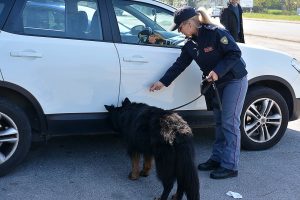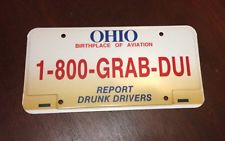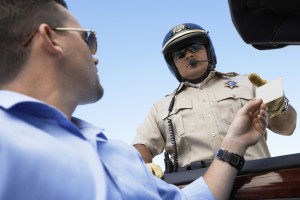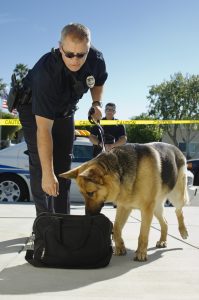 The Ohio Supreme Court recently decided a case in which an officer conducted a traffic stop after learning the basis for the stop was no longer valid. The issue was whether evidence obtained from the stop was admissible in the defendant’s trial. This issue was addressed by this court in 1984. However, in the recent case, the Court reached a different conclusion.
The Ohio Supreme Court recently decided a case in which an officer conducted a traffic stop after learning the basis for the stop was no longer valid. The issue was whether evidence obtained from the stop was admissible in the defendant’s trial. This issue was addressed by this court in 1984. However, in the recent case, the Court reached a different conclusion.
Articles Tagged with Search And Seizure
Inventory Searches and DUI/OVI in Ohio
 Following a DUI arrest (called ‘OVI’ in Ohio), it is common for an officer to search the suspect’s vehicle before having the vehicle towed. This ‘inventory search’ is an exception to the general requirement of a search warrant. For an inventory search to be valid, it must be done in accordance with the policy of the law enforcement agency. A recent case decided by the Ohio Supreme Court addressed what evidence is necessary to prove the search complied with the law enforcement agency’s policy. Continue Reading
Following a DUI arrest (called ‘OVI’ in Ohio), it is common for an officer to search the suspect’s vehicle before having the vehicle towed. This ‘inventory search’ is an exception to the general requirement of a search warrant. For an inventory search to be valid, it must be done in accordance with the policy of the law enforcement agency. A recent case decided by the Ohio Supreme Court addressed what evidence is necessary to prove the search complied with the law enforcement agency’s policy. Continue Reading
Nate Hobbs’ Case and Detentions for DUI / OVI investigations
 Although it is starting to look like it, this is not a blog about NFL players charged with DUI (called ‘OVI’ in Ohio). Recent articles discussed the cases of Henry Ruggs III and Geno Smith because those cases illustrated legal concepts related to DUI/OVI. The last article, about Geno Smith’s arrest, addressed what evidence indicates a driver may be under the influence before a traffic stop. In some DUI/OVI cases, traffic stops are not an issue, such as when the driver is in an accident or found passed-out behind the wheel. The legal concept at issue in those cases is when the driver is ‘seized’ and whether the seizure is legal. The case of Las Vegas Raiders cornerback Nate Hobbs illustrates that concept.
Although it is starting to look like it, this is not a blog about NFL players charged with DUI (called ‘OVI’ in Ohio). Recent articles discussed the cases of Henry Ruggs III and Geno Smith because those cases illustrated legal concepts related to DUI/OVI. The last article, about Geno Smith’s arrest, addressed what evidence indicates a driver may be under the influence before a traffic stop. In some DUI/OVI cases, traffic stops are not an issue, such as when the driver is in an accident or found passed-out behind the wheel. The legal concept at issue in those cases is when the driver is ‘seized’ and whether the seizure is legal. The case of Las Vegas Raiders cornerback Nate Hobbs illustrates that concept.
What If An Officer Asks To Search Your Car During a Traffic Stop?
 In my experience as a criminal defense attorney, I have seen countless cases which began as simple traffic stops but escalated quickly into something far more complicated. Those more complicated cases often result from the officer searching my client’s vehicle and finding something illegal. Frequently, the officer’s search is based on the driver’s consent to the search. But what if the officer asks to search the vehicle and the driver doesn’t explicitly say yes or no? This question was answered in a recent appellate decision, and the answer can impact Ohio DUI/OVI cases.
In my experience as a criminal defense attorney, I have seen countless cases which began as simple traffic stops but escalated quickly into something far more complicated. Those more complicated cases often result from the officer searching my client’s vehicle and finding something illegal. Frequently, the officer’s search is based on the driver’s consent to the search. But what if the officer asks to search the vehicle and the driver doesn’t explicitly say yes or no? This question was answered in a recent appellate decision, and the answer can impact Ohio DUI/OVI cases.
Ohio Supreme Court To Decide Legality Of Stops Based On Anonymous Tips
 If another driver becomes angry with you, that driver can easily call the police and report you as a drunk driver. The driver doesn’t have to give a statement to the police. In fact, the allegation can be completely anonymous.
If another driver becomes angry with you, that driver can easily call the police and report you as a drunk driver. The driver doesn’t have to give a statement to the police. In fact, the allegation can be completely anonymous.
Should police officers be permitted to stop you based only on another person’s anonymous tip? That question will be answered by the Ohio Supreme Court, as it recently agreed to hear the case of State v. Tidwell. The case could have broad implications, not for not just OVI cases, but for individuals’ Fourth Amendment protections in general.
Can You Be Pulled Over In Ohio For Someone Else’s Crime?
 Imagine for a minute that your car is in the shop. You have some errands to run, so you borrow someone else’s car. A friend, a family member, a coworker, whomever. As you’re driving to the store, you see a police cruiser activate its lights and sirens to pull you over. You weren’t speeding, you didn’t drive over the lane line, you followed every traffic rule in the book. So why are you being pulled over? The officer walks up to your window and says you were stopped because the officer ran the car’s license plate and learned the registered owner of the car had their license revoked. The officer didn’t make any effort to determine whether that registered owner was actually driving the car: he just saw the revocation and pulled you over.
Imagine for a minute that your car is in the shop. You have some errands to run, so you borrow someone else’s car. A friend, a family member, a coworker, whomever. As you’re driving to the store, you see a police cruiser activate its lights and sirens to pull you over. You weren’t speeding, you didn’t drive over the lane line, you followed every traffic rule in the book. So why are you being pulled over? The officer walks up to your window and says you were stopped because the officer ran the car’s license plate and learned the registered owner of the car had their license revoked. The officer didn’t make any effort to determine whether that registered owner was actually driving the car: he just saw the revocation and pulled you over.
Is the officer allowed to do this?
Don’t Be A Target Of DUI / OVI Investigations

You may be more of a target than you think. When you think about people arrested for drunk driving, do you picture a car driving erratically all over the road? That’s a common misconception. Most stops resulting in DUI/OVI charges are for minor offenses: failing to signal, driving a little over the speed limit, crossing a lane line one time. Some are even for non-moving violations: burned-out headlight, no license plate light, expired registration. A case decided last week by the Ohio Supreme Court illustrates how a minor violation can lead to more serious charges.
High Court Hears Oral Argument In Third Case Involving Warrantless Blood Test
 The United States Supreme Court recently heard oral arguments in the case of Mitchell v. Wisconsin. As this blog discussed previously, this the third case in a series of cases dealing with whether the police can take a DUI/OVI suspect’s blood without a search warrant. The questions and statements from the bench during the oral argument may telegraph how each justice views the issue. However, in our experience, it is difficult to predict the outcome of a case based on the oral arguments.
The United States Supreme Court recently heard oral arguments in the case of Mitchell v. Wisconsin. As this blog discussed previously, this the third case in a series of cases dealing with whether the police can take a DUI/OVI suspect’s blood without a search warrant. The questions and statements from the bench during the oral argument may telegraph how each justice views the issue. However, in our experience, it is difficult to predict the outcome of a case based on the oral arguments.
Officer Obtains Urine Test Result From Nurse: DUI Dismissed
 Brynn Campbell was involved in a head on-crash which killed the 83-year-old woman driving the other car. Campbell was taken to the hospital, and hospital staff performed a urine test. Although Campbell showed no obvious signs of impairment, a police officer went to the hospital and asked the nurse for the urine test results. The results showed Campbell’s alcohol level was well over the limit, according to the Global News. The officer then obtained a search warrant to obtain Campbell’s urine samples and have them tested. Campbell was charged with vehicular homicide. She was acquitted by the trial court, and the prosecution appealed.
Brynn Campbell was involved in a head on-crash which killed the 83-year-old woman driving the other car. Campbell was taken to the hospital, and hospital staff performed a urine test. Although Campbell showed no obvious signs of impairment, a police officer went to the hospital and asked the nurse for the urine test results. The results showed Campbell’s alcohol level was well over the limit, according to the Global News. The officer then obtained a search warrant to obtain Campbell’s urine samples and have them tested. Campbell was charged with vehicular homicide. She was acquitted by the trial court, and the prosecution appealed.
Search Of Purse Creates Controversial Court Case

Jamie was driving down the highway with her boyfriend when a police officer stopped Jamie for speeding. It turned out Jamie did not have a driver license, and there was an active warrant for her arrest. The officer put Jamie in the back of his cruiser and placed her under arrest.
 Columbus OVI/DUI Attorney Blog
Columbus OVI/DUI Attorney Blog

